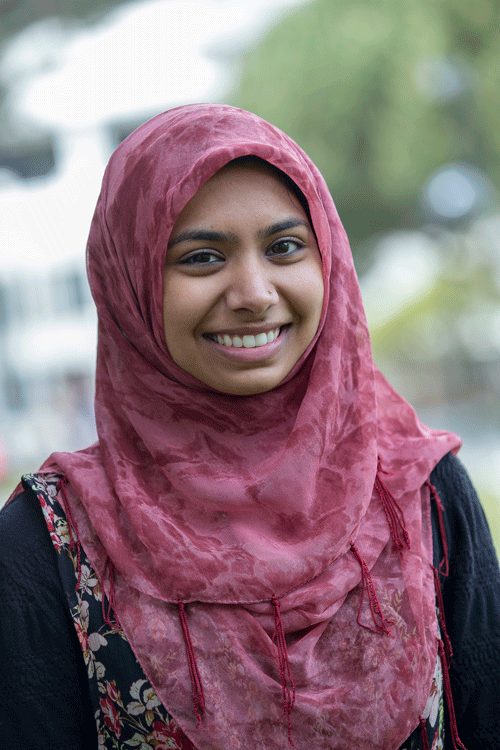
The M.A. in Mathematics at SF State offers students the opportunity to study advanced mathematics under the guidance of a faculty encompassing many different areas of research. Classes are small, usually fewer than 20, and graduate students pursue their own mathematical interests through seminars and research projects with faculty members.
Admission to the program requires an undergraduate degree but not necessarily in mathematics. Many students with minors in math have succeeded in the SF State graduate program.
Successful applicants are expected to have completed three semesters of calculus, linear algebra, and three upper division math courses, including modern algebra and real analysis, with a grade of B or better. However, an applicant may be admitted conditionally on passing any missing course satisfactorily during the first calendar year of study.
The following are the materials required of applicants to the program:
- Two letters of recommendation, preferably but not necessarily from math professors.
- A personal statement.
- A transcript, which may be either official or unofficial.
Note that neither the GRE nor the TOEFL tests are required.
The expected completion time for the program is two years. After graduation, students enroll in Ph.D. programs or seek employment in the San Francisco Bay Area's technology and financial industries or at one of California's 110 community colleges.
For more general information, contact the Graduate Coordinator Dr. Chun-Kit Lai.
In addition to coursework, the M.A. degree requires a Culminating Experience, for which there are two options:
- Write and defend a Master's thesis.
- Write an Academic Report on a special topic and pass two Comprehensive Exams.
Details on these two options, as well as the timeline toward graduation for each, can be found in What is the Mathematics MA Culminating Experience? A summary of the general requirements and deadlines for a graduate degree can be found in the SFSU Steps to Graduation.
If you are writing a Master's thesis, you will need a committee of three faculty (your advisor and two additional faculty members).
If you are writing an Academic Report and taking comprehensive exams, you will need a committee of two faculty (an advisor and a second reader).
Below is a list, by author, of recent M.A. Thesis reports. Each thesis is available as an accessible PDF in an online folder of M.A. Thesis examples.
- Alexandra Aguilar, “Using Diagnostic Testing to Challenge Barriers to Access and Inform Instruction in Calculus I” (advisor: Kim Seashore)
- Vanessa Aguirre, “A Classification of Weight One Partitions” (advisor: Dusty Ross)
- Paul Carmody, "An Examination of Personal Authority in Discrete Mathematics" (advisor: Shandy Hauk)
- Chenghui (Calvin) Chen, “The Tail l_2 and Tail l_{1-2}-Minimization in Compressed Sensing and Solution Conditions” (advisor: Shidong Li)
- Dexter Dysthe, “Fourier and Hausdorff Dimension of Centered Continuous Additive Processes” (advisor: ChunKit Lai)
- Addie Andromeda Evans, “Inferring Small Trees with Phylogenetic Invariants and Inequalities” (advisor: Serkan Hosten)
- Luke Evans, “Phase and Conjugate Phase Retrieval on Paley-Wiener Spaces and C^M” (advisor: ChunKit Lai)
- Christopher Gibson, "A Qualitative Study of What Ideas New Graduate Teaching Associates Report from Student-Centered Instruction in Professional Development" (advisor: Shandy Hauk)
- Domenic J. Gulli, "A Qualitative Study of Instructor Perceptions of Teaching in the Wake of AB705" (advisor: Shandy Hauk)
- Matthew Heid, “(Symmetry-Adapted) Gram Spectrahedra of Binary Forms” (advisor: Serkan Hosten)
- Rose Johnson-Leiva, “Realizing Graphs as Curve-Incidence Graphs” (advisors: Emily Clader and Dusty Ross)
- Patrick Kwon, “Analyzing Peer-Assisted Reflections in a Developmental College Mathematics Course” (advisor: Kim Seashore)
- Therese-Marie Basa Landry, “Multidimensional Continued Fractions, Tilings, and Roots of Unity” (advisor: Yitwah Cheung)
- Daniel Lemke, “Maximum Likelihood Estimation and Fixed Point Ideals for Binary Tensors” (advisor: Serkan Hosten)
- Abraham Nassar, “Multi-Channel Medical Image Reconstruction Using Fusion Frames” (advisor: Shidong Li)
- George Nacouzi, "Post-Pandemic Transition from Online to On-Campus Learning Environments for College Mathematics Instructors" (advisor: Shandy Hauk)
- Hal Prince, “Spectral Properties of Some Unions of Linear Spaces” (advisor: ChunKit Lai)
- Hannah Winkler, “Triangulations of Gale Duals of Root Polytopes” (advisors: Federico Ardila and Matt Beck)
- Diana Zambrano, “Equity Oriented Practices in a College Level Pre-Calculus Classroom” (advisor: Kim Seashore)
- Sandra Zuniga Ruiz, “Bivariate Order Polynomials” (advisors: Federico Ardila and Matt Beck)
Below is a list, by author, of recent M.A. Academic Reports. Each report is available as an accessible PDF in an online folder of M.A. Academic Reports.
- Julie Come, “A Glimpse Beyond the Second Dimension: An Introduction to Orthogonally Decomposable Tensors Via Matrices” (advisor: Serkan Hosten)
- Stephanie Magallanes, “Neural Codes and the Neural Ideal: An Application of Algebraic Geometry” (advisor: Emily Clader)